Hieken Powell Flute to NEC Chair
Family of flutist Donna Hieken entrusts gold flute to occupant of Hieken Flute Chair.
NEC Receives Classic Gold Powell Flute on Indefinite Loan from Family of Late Donna Hieken
To Be Used by Occupant of Donna Hieken Flute Chair Currently Held by Paula Robison
Instrument Compared to a Stradivarius for its Beauty of Tone and Agility
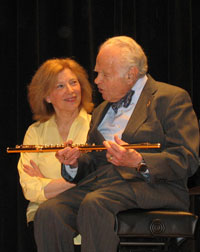 When Paula Robison welcomed good friend Chuck Hieken to her new NEC studio recently, she was looking forward to trying out the gold Powell flute that had belonged to his late wife, Donna. Robison, who occupies the Donna Hieken Flute Chair established by the Hiekens in 2005 with support from Pete and Ginny Nicholas, had heard reports about the instrument, made by the premier Boston workshop of Verne Q. Powell. She was curious and also thought the family might want advice on how best to care for the flute. She didn’t expect what happened next.
When Paula Robison welcomed good friend Chuck Hieken to her new NEC studio recently, she was looking forward to trying out the gold Powell flute that had belonged to his late wife, Donna. Robison, who occupies the Donna Hieken Flute Chair established by the Hiekens in 2005 with support from Pete and Ginny Nicholas, had heard reports about the instrument, made by the premier Boston workshop of Verne Q. Powell. She was curious and also thought the family might want advice on how best to care for the flute. She didn’t expect what happened next.
“I played three notes and I felt as though I had found the flute of my dreams,” Robison recounted. “It is rich, agile, resonant. I felt as though I'd been handed a Stradivarius. I was just sitting there, marveling at it, trying to play something for Chuck which would bring him joy and evoke Donna's bright spirit for him.” Then, Hieken suddenly announced that he would like to entrust the flute to NEC and the occupant of the Hieken Chair. It would be on “indefinite loan.”
Robison “was stunned. I never expected this...I was just going to try the instrument and advise him how to care for it.”
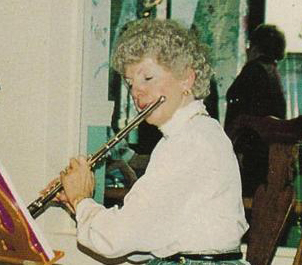 The flute had been the prized possession and instrumental voice of Donna, who died last summer. NEC celebrated “An Appreciation of Life” honoring the flutist and teacher on September 23, 2012 in Williams Hall. Crafted in the 1970s, the instrument had also been a surprise when Chuck Hieken presented it to his wife at a dinner party with friends. “It was still unfinished, so I brought just the tube,” Hieken recalled. “It came in a beat up case wrapped in old newspaper.” There was no particular occasion for the gift. “It was just something I wanted to get for her and which I arranged to have built at Powell.”
The flute had been the prized possession and instrumental voice of Donna, who died last summer. NEC celebrated “An Appreciation of Life” honoring the flutist and teacher on September 23, 2012 in Williams Hall. Crafted in the 1970s, the instrument had also been a surprise when Chuck Hieken presented it to his wife at a dinner party with friends. “It was still unfinished, so I brought just the tube,” Hieken recalled. “It came in a beat up case wrapped in old newspaper.” There was no particular occasion for the gift. “It was just something I wanted to get for her and which I arranged to have built at Powell.”
Donna, who had studied at NEC, then completed both undergraduate and graduate degrees at Boston University, was a respected and accomplished performer and teacher. She was for many years principal flute of the Boston Philharmonic Orchestra and its predecessor, the Civic Symphony of Boston. With the former orchestra and her gold flute, she played, among other highlights, performances of the Dvorak Cello Concerto with a very young but promising Yo-Yo Ma and the Mahler Symphony No. 2 in Carnegie Hall. She also was a member of the Cantilena Woodwind Quintet for over 15 years, performed professionally with other groups, and taught both privately and at the University of Rhode Island. In addition, she served as editor of the Schwann Catalog’s Artist Issue of CDs, tapes, and LPs. She and her husband were married for 51 years and had two children.
The last time she played the flute in public was for her husband’s 60th MIT reunion in 2011 at the Peabody Essex Museum. She played Debussy’s Syrinx and Clair de lune and Harry von Tilzer’s Fantasy on “She’s Only a Bird in a Gilded Cage.” NEC flutist Fenwick Smith performed those same three selections at the "Appreciation of Life" concert. Even after she was no longer able to play in public, Donna “would pick up the flute and run through a scale or two,” Hieken remembered. “And she used to carry it around with her. She was very connected to it in a deep way.”
To loan the instrument to NEC was “not a difficult decision,” Hieken said. It made sense “to keep it playing and to entrust it to someone with skill similar to that of Donna.”
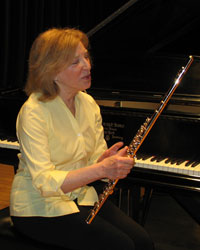 Since receiving the flute, Robison says, “my whole life has changed. I feel reborn as an artist. Donna's voice is alive through me and it's very inspiring. I have been practicing every minute I can and sending Chuck bulletins on my progress getting to know the Donna Hieken Powell. (Stradivari have names, and this flute should have one, too.)”
Since receiving the flute, Robison says, “my whole life has changed. I feel reborn as an artist. Donna's voice is alive through me and it's very inspiring. I have been practicing every minute I can and sending Chuck bulletins on my progress getting to know the Donna Hieken Powell. (Stradivari have names, and this flute should have one, too.)”
So what makes this flute so special? “The flute is 14K gold, made in 1977. The beautiful lip plate (where the flutist actually creates the sound) is by the great innovator Albert Cooper," Robison said. "Cooper devised a new scale for flutes which helped us to play in tune much more easily and the Hieken Powell has a Cooper scale.
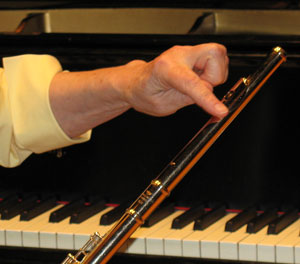 “It takes many people to put a flute together, and among the superb craftsmen who made this flute were Robert and Bickford Brannen. The next year they went on their own and founded Brannen Brothers Flutemakers. I've been playing a great Brannen all these years! So it's wonderful to sense the connection...like playing a piece of history.
“It takes many people to put a flute together, and among the superb craftsmen who made this flute were Robert and Bickford Brannen. The next year they went on their own and founded Brannen Brothers Flutemakers. I've been playing a great Brannen all these years! So it's wonderful to sense the connection...like playing a piece of history.
"My first really good flute was a Powell (I was 16 years old) and I played a Powell until 1978 when I became a Brannen Artist. I just found the letters between my father and Verne Q Powell about ordering that flute, waiting for it to be finished (they joked about me ‘holding my breath’), my parents’ excitement of taking it up to me at music camp. The letters are delightful. At that time, the Powell workshop was still located at 295 Huntington Avenue, a building now part of NEC, another sweet connection. One of the reasons I feel so young playing the Donna Hieken Powell is that it feels very much like the flute I had all those years ago. I am using some of the old fingerings...it's amazing how much is flooding back.”
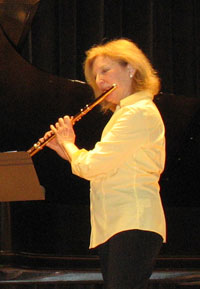 Robison will give her first public performances with the Donna Hieken Powell flute when she solos with A Far Cry chamber orchestra, April 20 at St. John’s Episcopal Church in Jamaica Plain and on April 21 at the Isabella Stewart Gardner Museum. She will play the Vivaldi Flute Concerto in G-minor, Op. 10, No. 2.
Robison will give her first public performances with the Donna Hieken Powell flute when she solos with A Far Cry chamber orchestra, April 20 at St. John’s Episcopal Church in Jamaica Plain and on April 21 at the Isabella Stewart Gardner Museum. She will play the Vivaldi Flute Concerto in G-minor, Op. 10, No. 2.
For further information, check the NEC Website at: http://necmusic.edu or call the NEC Concert Line at 617-585-1122. NEC’s Jordan Hall, Brown Hall, Williams Hall and the Keller Room are located at 30 Gainsborough St., corner of Huntington Ave. St. Botolph Hall is located at 241 St. Botolph St. between Gainsborough and Mass Ave.
ABOUT NEW ENGLAND CONSERVATORY
Recognized nationally and internationally as a leader among music schools, New England Conservatory in Boston, MA offers rigorous training in an intimate, nurturing community to 720 undergraduate, graduate, and doctoral music students from around the world. Its faculty of 225 boasts internationally esteemed artist-teachers and scholars. Its alumni go on to fill orchestra chairs, concert hall stages, jazz clubs, recording studios, and arts management positions worldwide. Nearly half of the Boston Symphony Orchestra is composed of NEC trained musicians and faculty.
The oldest independent school of music in the United States, NEC was founded in 1867 by Eben Tourjee. Its curriculum is remarkable for its wide range of styles and traditions. On the college level, it features training in classical, jazz, contemporary improvisation, world and early music. Through its Preparatory School, School of Continuing Education, and Community Programs and Partnerships Program, it provides training and performance opportunities for children, pre-college students, adults, and seniors. Through its outreach projects, it allows young musicians to engage with non-traditional audiences in schools, hospitals, and nursing homes—thereby bringing pleasure to new listeners and enlarging the universe for classical music, jazz, and contemporary improvisation.
NEC presents more than 900 free concerts each year, many of them in Jordan Hall, its world- renowned, century-old, beautifully restored concert hall. These programs range from solo recitals to chamber music to orchestral programs to jazz, contemporary improvisation, and opera scenes. Every year, NEC’s opera studies department also presents two fully staged opera productions at the Cutler Majestic Theatre or Paramount Theatre in Boston.
NEC is co-founder and educational partner of From the Top, a weekly radio program that celebrates outstanding young classical musicians from the entire country. With its broadcast home in Jordan Hall, the show is now carried by National Public Radio and is heard on 250 stations throughout the United States.
Contact: Ellen Pfeifer
Senior Communications Specialist
New England Conservatory
290 Huntington Ave.
Boston, MA 02115
617-585-1143
Ellen.pfeifer@necmusic.edu
